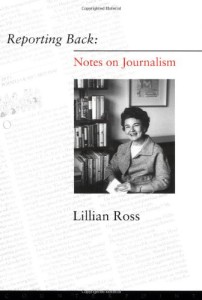
The below is from a recent article about Lillian Ross who wrote an iconic interview of Hemingway. I quote just a bit but reprint my blog post on this topic. Thank you as always for your interest in Hemingway. Love, Christine
“Lillian Ross, who recently died at the age of 99, was one of the most remarkable writers of her time. She wrote for The New Yorker for half a dozen decades and redefined magazine journalism while providing fresh, vivid accounts of reality. She was never seen writing a note. The critic Edmund Wilson called her “the girl with the built-in tape-recorder.”
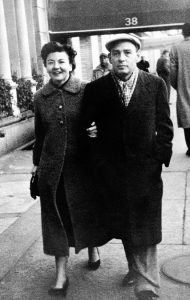
Her clever handling of quotations was not always admired. She first aroused intense criticism with her profile of Ernest Hemingway, published in The New Yorker in 1950. Hemingway loved to talk about himself, especially when drinking, and he particularly liked comparing himself to champion athletes. When Ross interviewed him, he had just turned 50.

Many believed that she had depicted the leading American novelist of the day as a drunken blowhard. Hemingway didn’t think so. He liked the article and years later even provided a jacket blurb for a book by Ross.”
Read my blog post on this from a while ago. So sorry for Ms. Ross’ passing as she was a fine journalist, but Hemingway, from my reading, was not thrilled with the article she wrote. He accepted that it was what it was, the dye was cast, and maintained a friendship with her. My post is below.
Older post from nov 2015
How Do You Like It Now, Gentlemen?
The above is a link to the Lillian Ross interview with Hemingway, a sad betrayal of his kindness and friendship to a young writer. My thoughts on this below.
There’s a famous profile of Hemingway that was published on May 13, 1950 in The New Yorker done by a very young journalist at the time named Lillian Ross. Hemingway had helped her with her first big article about Sidney Franklin, the first Jewish-American bull fighter. Hemingway and Lillian Ross became friends and as Hemingway often did, he enjoyed taking this younger, very smart woman under his wing and addressing her as “daughter” and sharing some of the things that he knew with her.
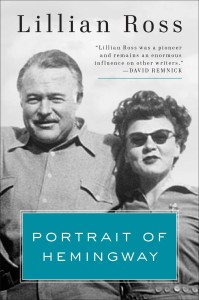
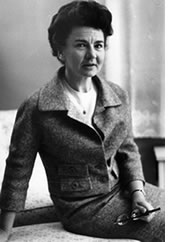
Lillian Ross started working at The New Yorker in 1945 and seemed particularly adept at charming her subjects into saying things they might otherwise not say. She asked to do a profile on Hemingway, who needed the publicity like a hole in the head, but he agreed, hoping to help her career. She shadowed him for months and in particular went with him to New York on a three-day tour. Hemingway viewed it all as a lark.
Here’s where my objectivity stops. As I noted in my opening post five years ago, while I try to be objective about Hemingway and his flaws, which were many, I’m on his side. I’m not neutral. Lillian Ross’ article made him look like a self-involved jerk, almost ignorant. He thought she was his friend.
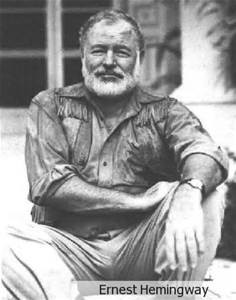
In that article are statements by Hemingway such as “Book is like engine. We have to slack her off gradually.” And then there’s this repeated gem apropos of nothing, “How do you like it now, Gentlemen.” Ross always maintained that it was an affectionate portrait of a wonderful writer, but, in essence, it made fun of him and it made him look ludicrous. If that’s how she saw him, then so be it. The press is free and she can write what she’d like to write, but don’t pretend it was an “affectionate” portrayal.
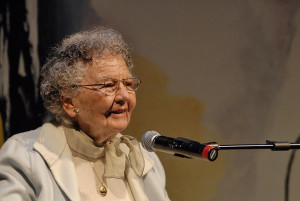
At the time, Lillian Ross was 24 years old and it was the opportunity of a lifetime to profile Ernest Hemingway, the biggest writer of the day. Years later, The New York Times wrote that “The effect of her severely unadorned portrait was to create an impression of an unpleasant egotist, a celebrity who, to a pathetic extent, had identified himself with his own public image.” As one of Hemingway’s biographers, Jeffrey Meyers, wrote later that she’d repaid his generosity with meanness and malice, and established her reputation at his expense.” Quoting Meyers again, he notes that she never recorded or revealed the serious and sensitive side of his character and chose instead to portray him as a boring braggart. So how do you like it now, Gentlemen?

When Lillian published the profile in book form shortly after Hemingway’s death, she still claimed it was a sympathetic portrait of a great, loveable man. Few readers were fooled. She also claimed he was fine with it. True. He read it before publication; felt the dye was cast so said little; and passed on it, but it was not really “fine” with him. He was hurt.
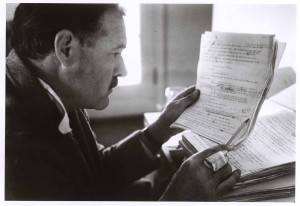
If you look at the cover, could Lillian have picked a less attractive, less compelling photo? (See below right). In a reissue, there’s a nice photo of Hemingway and Lillian on the front, but I believe the original shows a Hemingway looking out of it and bizarre. If I’m wrong on this, someone out there probably knows, so please correct me.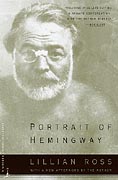
Lillian Ross has written a new book in which Ross has collected selected pieces, including the Hemingway profile along with newer works spanning her sixty year career as a journalist. It is called “Reporting Always: Writings From The New Yorker.” It was published last week by Scribner’s, which, of course, is Hemingway’s publisher.
I can’t help being wounded for him. He trusted her and thought they were having some fun together and that she would not portray him as a lout. It’s his fault in part, no question for being too casual and not foreseeing damage for not taking the interview seriously. However, his loyalty was betrayed.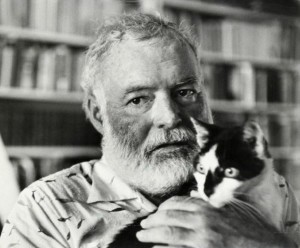
Take a read and see what you think. Perhaps you’ll see it differently. I’m happy to stand corrected or confronted.
Love,
Christine


“If you look at the cover, could Lillian have picked a less attractive, less compelling photo? (See below right). ”
You’ve made a leaping and very likely incorrect assumption here: that the author chose the cover (publishers choose the covers of the books they publish). Further…
“…I believe the original shows a Hemingway looking out of it and bizarre. If I’m wrong on this, someone out there probably knows, so please correct me.”
The first edition of this book has NO images, just typography. This is an easily verifiable fact given the internet, which makes it bizarre that you didn’t bother check.
Thank you for your comment, Joshua. I defer to your greater knowledge on this subject and appreciate you pointing it out. Best regards to you, Christine
That’s not a profile, it’s not even an interview, it IS Ernest Hemingway. As you noted Edmund Wilson called Ross “the girl with the built-in tape recorder.” That’s all that piece is, recorded tape. And on that tape, unfiltered Hemingway. It’s not an article, it’s documentary.
Look, to go where the big dog’s piss on Ernest Hemingway you have to know who John W. Aldridge was. Aldridge was the greatest literary critic in America and one of a distinct few with the balls to call “The Old Man and the Sea” for what it was, in Aldridge’s words “distinctly minor Hemingway”:
https://www.vqronline.org/book-reviews/%E2%80%9C-work-distinctly-minor-hemingway-fiction%E2%80%9D
Aldridge was anything but just another unloving shark of tearing apart the great swordfish though, Hemingway’s decline pained Aldridge too, as he had grown up with the Lost Generation bunch as his heroes. Hemingway was always a bullshitter but as long as his work didn’t fall off, Aldridge was ok. He was rather like Picasso, another fellow-traveler commie-lover who lived la vida loca, entertained celebs, and complained about “the rich” but just could not stop hanging out with them. This is a man (Hemingway) who drank cocktails while watching from the sidelines as Castro and Che Guevara had Cubans shot while telling a nearby witness “They all deserved it.” The literati dismiss that, naturally being Left-wingers, their only concern was IS IT GOING TO SUCK LIKE “ACROSS THE RIVER AND INTO THE TREES”?
So with your permission, allow me to take you back to that time period just after the Ross interview by way of John W. Aldridge. Simply go here, go to the Table of Contents, and click on THE SUN ALSO RISES SIXTY YEARS LATER:
https://books.google.com/books?id=ktDe73I1xr8C&printsec=frontcover&source=gbs_book_other_versions_r&cad=4#v=onepage&q=trailer&f=false
You can see the general feeling then was that he was not in decline, he was like a boxer who was making a comeback. There was gossip that a big WWII book was coming too (IF you really want to make a name for yourself, I’d contact Scribner’s and get ahold of all his notes on that and put something together – clearly it will not be a novel or they would have done it, but a “facsimile” might be in order.). You need to read the Aldridge piece though. As he says “The more we know about him, the less we like him, but the more we find him fascinating.”
DearEdward: thank you for your insights which are clearly well informed and with much knowledge that I am missing. I for sure will read the link you sent. I am always not just happy to be educated but want to be. I appreciate your comments and informed observations. Very best. Christine